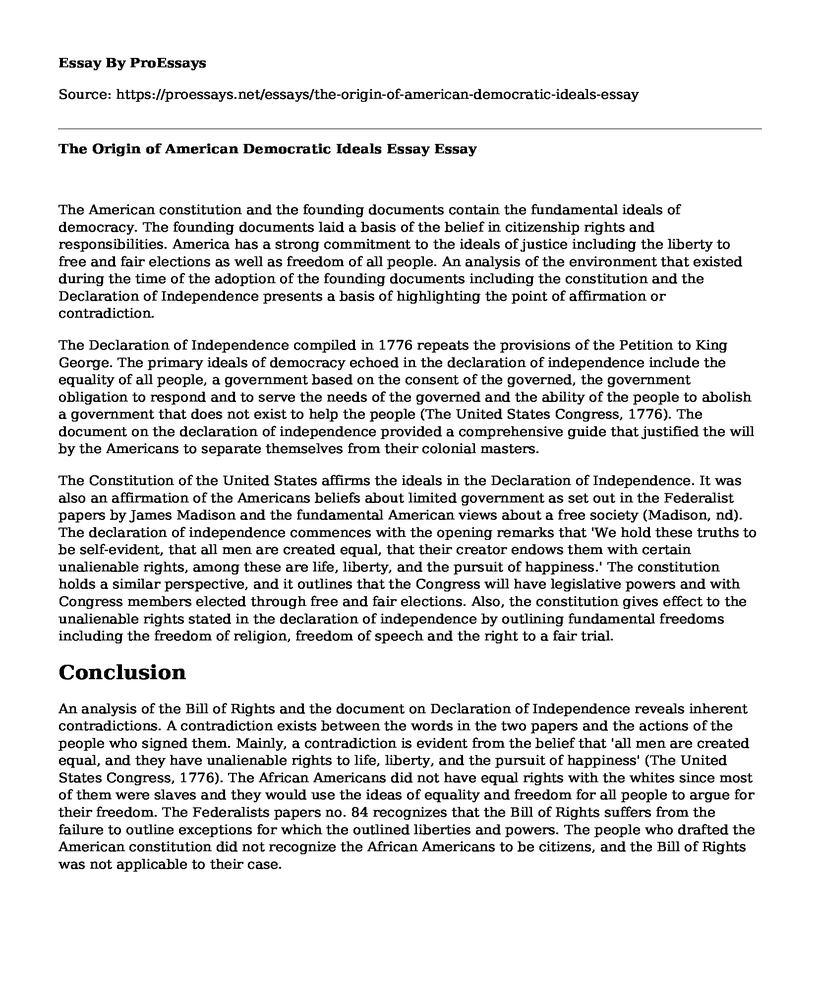The American constitution and the founding documents contain the fundamental ideals of democracy. The founding documents laid a basis of the belief in citizenship rights and responsibilities. America has a strong commitment to the ideals of justice including the liberty to free and fair elections as well as freedom of all people. An analysis of the environment that existed during the time of the adoption of the founding documents including the constitution and the Declaration of Independence presents a basis of highlighting the point of affirmation or contradiction.
The Declaration of Independence compiled in 1776 repeats the provisions of the Petition to King George. The primary ideals of democracy echoed in the declaration of independence include the equality of all people, a government based on the consent of the governed, the government obligation to respond and to serve the needs of the governed and the ability of the people to abolish a government that does not exist to help the people (The United States Congress, 1776). The document on the declaration of independence provided a comprehensive guide that justified the will by the Americans to separate themselves from their colonial masters.
The Constitution of the United States affirms the ideals in the Declaration of Independence. It was also an affirmation of the Americans beliefs about limited government as set out in the Federalist papers by James Madison and the fundamental American views about a free society (Madison, nd). The declaration of independence commences with the opening remarks that 'We hold these truths to be self-evident, that all men are created equal, that their creator endows them with certain unalienable rights, among these are life, liberty, and the pursuit of happiness.' The constitution holds a similar perspective, and it outlines that the Congress will have legislative powers and with Congress members elected through free and fair elections. Also, the constitution gives effect to the unalienable rights stated in the declaration of independence by outlining fundamental freedoms including the freedom of religion, freedom of speech and the right to a fair trial.
Conclusion
An analysis of the Bill of Rights and the document on Declaration of Independence reveals inherent contradictions. A contradiction exists between the words in the two papers and the actions of the people who signed them. Mainly, a contradiction is evident from the belief that 'all men are created equal, and they have unalienable rights to life, liberty, and the pursuit of happiness' (The United States Congress, 1776). The African Americans did not have equal rights with the whites since most of them were slaves and they would use the ideas of equality and freedom for all people to argue for their freedom. The Federalists papers no. 84 recognizes that the Bill of Rights suffers from the failure to outline exceptions for which the outlined liberties and powers. The people who drafted the American constitution did not recognize the African Americans to be citizens, and the Bill of Rights was not applicable to their case.
References
The United States Congress. (1776). Declaration of Independence in Congress
Madison, James (nd). The Federalist Papers
Cite this page
The Origin of American Democratic Ideals Essay. (2022, Jul 18). Retrieved from https://proessays.net/essays/the-origin-of-american-democratic-ideals-essay
If you are the original author of this essay and no longer wish to have it published on the ProEssays website, please click below to request its removal:
- Similarities and Differences Between Texas Governors and the U.S. President
- Essay on Violation of Individual Rights and Liberty
- Supreme Court Rulings and Its Impact on America Essay
- Torture Is Never Justified - Argumentative Essay
- Research Paper on Climate-Change Policies for Low Carbon Transition
- Murder, Gangs, and Drugs: Judge Seeks Jail for DC Defendant - Essay Sample
- Conviction - Case Study Example







